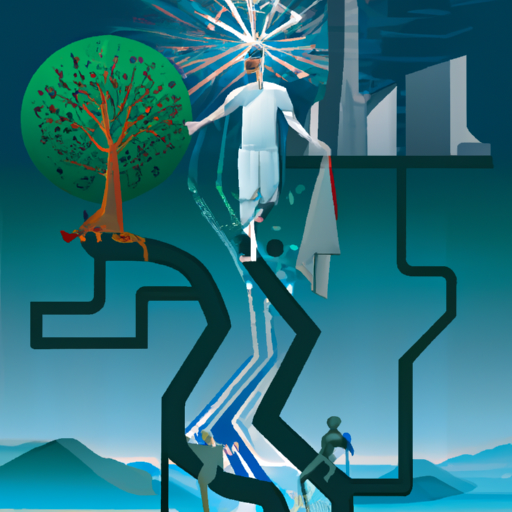As a 36-year-old ex-Jehovah’s Witness, I understand the challenges and struggles that many of us face after leaving the organization. When I served in the computer department at the JW Headquarters from 2009 to 2017, I experienced firsthand the sense of community and belonging that the organization provided. But I also realized that there’s a world of opportunities out there, waiting to be discovered.
In this blog post, I want to share with you some alternative activities and groups that can offer similar or even better mental health benefits, personal growth, and a sense of community that we once found in our previous lives. These suggestions are inclusive and supportive of diverse groups, including LGBTQ+ individuals.
Leaving the Jehovah’s Witnesses organization is a significant life change, but it also presents an opportunity to explore new paths and build a fulfilling life outside of the organization. I hope that these suggestions can help you find activities and communities that provide mental health benefits, support personal growth, and foster a sense of belonging and connection for everyone, including LGBTQ+ individuals.
- Support Groups: Local chapters of the National Alliance on Mental Illness (NAMI) offer various support groups and resources for individuals and families affected by mental health conditions. LGBTQ+ specific support groups can also be found in many communities, providing a safe and affirming space for connection and understanding. Check out www.nami.org and local LGBTQ+ organizations for resources in your area.
- Meditation or Mindfulness Groups: I’ve personally benefited from meditation practices, and there are numerous meditation centers and mindfulness groups across the country that offer classes, workshops, and retreats for individuals interested in these practices. Many centers are LGBTQ+ friendly and strive to create inclusive environments.
- Social Clubs or Hobby Groups: Explore local social clubs and hobby groups based on your interests, such as sports, arts, or book clubs. Platforms like Meetup (www.meetup.com) are a great way to find groups in your area, including those specifically for the LGBTQ+ community.
- Volunteer Work: Volunteering has given me a renewed sense of purpose and connection with my community. Websites like VolunteerMatch (www.volunteermatch.org) can help you find volunteer opportunities in your area based on your interests and availability, including LGBTQ+ organizations and causes.
- Educational Classes or Workshops: Continuing education is an excellent way to grow and expand your horizons. Local community colleges, universities, and adult education centers often offer a wide range of courses in various subjects, from arts to technology. Many institutions also provide LGBTQ+ focused courses or events.
- Interfaith or Spiritual Gatherings: Exploring alternative spiritual practices or participating in interfaith gatherings can offer opportunities for personal reflection, spiritual growth, and connection with a diverse community. Many spiritual centers and gatherings are LGBTQ+ inclusive and welcoming.
- Exercise or Outdoor Activities: Engaging in regular physical exercise or outdoor activities, such as walking, hiking, or yoga, can help relieve stress, boost mood, and improve overall mental health. Local parks, trails, and recreation centers often provide resources and programming for these activities, including LGBTQ+ friendly groups and events.
- Cultural Events: Attend cultural events, such as concerts, plays, or art exhibitions, in your community to enjoy intellectual and emotional stimulation, social interaction, and personal enrichment. Look for LGBTQ+ specific events or inclusive venues to further support and engage with the community.
- Therapy or Counseling: Seeking professional therapy or counseling can help individuals address mental health concerns, develop coping strategies, and foster personal growth and self-awareness. Many therapists specialize in working with LGBTQ+ clients, and online directories can help you find a provider near you.
- Work Community Activities: Many workplaces offer employee groups or events focused on shared interests, diversity and inclusion, or personal development. Check with your employer for available opportunities, including LGBTQ+ affinity groups or events.
Remember, it’s important to give yourself time and space to heal and adjust to your new life outside of the JW organization. Trying new activities, joining groups, or attending events may feel daunting at first, but with time and persistence, you’ll likely discover new interests, make new friends, and create a supportive network.
As you embark on this journey, remember that personal growth is a lifelong process. It’s essential to be patient with yourself and recognize that it’s normal to experience setbacks and challenges along the way. The key is to stay open to new experiences, remain curious, and continue seeking out opportunities for learning and growth.
May your journey be filled with discovery, growth, and connection, as you build a fulfilling and meaningful life outside of the Jehovah’s Witnesses organization. Embrace the diversity of experiences and individuals you will encounter, and always remember that your unique perspective and identity are valuable contributions to the communities you join.
Wishing you all the best on your journey,
Brandon Fiquett

